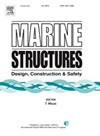Using the polynomial chaos expansion and bias-variance tradeoff to analyse the statistical characteristics of a trimaran cross-deck structure
Abstract
The tendency to design high-performance ships demonstrates the importance of the trimaran and the cross-deck is of particular interest due to its exclusive structures and wave loads. Limited by the high cost of structural numerical simulation, relevant studies emphasize the effectiveness of a specific design scheme. This paper introduces the polynomial chaos expansion (PCE) and the bias-variance tradeoff to explore the statistical characteristics of the cross-deck's strength. The geometric model of a high-speed trimaran is built and the load case is designed. Samples are obtained using the Latin hypercube sampling technique and the corresponding stress response of the cross-deck is extracted by the finite element method. To overcome the limitation of sample size, the PCE is applied as a surrogate model to compute the statistical indicators of the stresses and the bias-variance tradeoff is introduced to select the hyperparameter of the PCE. The results show that the stresses at the cross-deck's corner are much higher and more sensitive to the plate thickness than those at other locations. Furthermore, the PCE is also compared with the Monte Carlo simulation to demonstrate its advantages, and it is shown that the PCE performs better under the limitation of sample size considering accuracy and convergence. The feasibility and efficiency of the PCE and bias-variance tradeoff in the statistical analysis of trimaran cross-deck structure is proved. The insights and recommendations summarized will be a useful aid for the design and optimization of the trimaran.

 求助内容:
求助内容: 应助结果提醒方式:
应助结果提醒方式:


